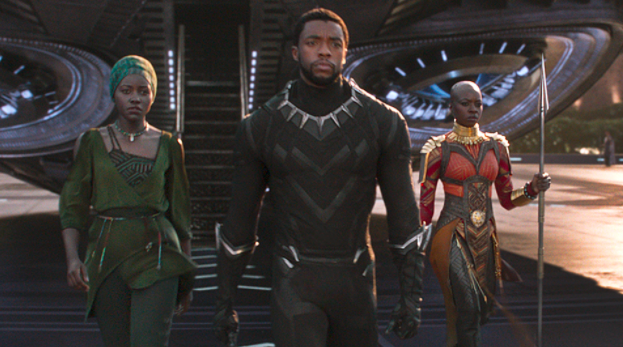Photo courtesy of Marvel.com
Marvel’s Black Panther takes us to the fictional nation of Wakanda, a technological superpower that has masqueraded as impoverished for centuries, despite far outpacing the rest of the world. There, in a bustling metropolis protruding from colorful farmland, we watch the young King T’Challa make his claim to the throne. This follows his father’s death in Captain America: Civil War, where he made his first cinematic appearance, though he’s shown his face in comic books since the mid-1960s. We follow his journey as he copes with his grief, combats a rebelling tribe, hunts down a foreign terrorist and eventually presents his country on the mainstream political stage.
Black Panther is the 18th addition to the Marvel Cinematic Universe and has been a game-changer for both the franchise and the American film industry as a whole. Not only is it the first solo film following a superhero of color, it also features the first almost entirely African and African-American ensemble in the history of the genre. The cast features powerhouses such as Chadwick Boseman, Michael B. Jordan and Academy Award winners Lupita Nyong’O and Angela Bassett. Opening at No. 1 at the box office, as all MCU movies have, it also earned the title of biggest domestic debut for a black director. In fact, it is on track to become the biggest film by a black director, period, along with biggest Marvel stand-alone movie.
But the true success of Black Panther is not a dollar amount. By viewers and critics alike, the film has been described as an overwhelming triumph. Its underlying anti-isolationist message is extremely relevant to the modern political scene, and the more prominent themes of equality and awareness overpower the simple motifs audiences have come to expect. It portrays women and people of color as powerful individuals and places them in pivotal roles, which is unfortunately rare in films of its magnitude. In doing so, Black Panther has taken great strides toward improving equal racial representation in entertainment.
Moreover, its ambitious, layered plotline shatters many of the tropes that fellow blockbusters too often tend to conform to. The villain is thought-provoking and humanized. The mentor is dishonest and flawed. The love interest fights her own battles. These characters, despite their otherworldly environment, feel elegantly real and constantly behave in accordance with their own complexity. Black Panther offers something for everyone to identify with and never fails to compel. It is through such feats that it has achieved the success it deserves.
Biggest achievements:
- Passes the Bechdel test with a hushed report from Nakia to Okoye regarding the safety of the princess and Queen Mother
- Overall phonomenal representation for women, including an all-female royal guard and tech icon
- Similarly stellar representation for Africans and African-Americans, who make up the vast majority of the cast and are defiant of any stereotypes
- Uses flashback and other moving sequences to develop the depth of plot
Biggest shortcomings:
- Occasionally compromises the natural flow of dialogue to forcefully interject jokes or references
Scores:
Fear factor: 3 / 10 – intense action, dramatic deaths and constant proximity to failure
Violence and gore: 5 / 10 – numerous drawn-out combat scenes, varying from tribal challenges with bladed weaponry to uprisings with advanced tech
Language: 4 / 10 – infrequent, medium-tier curse words or lewd gestures
Sexual content: 1 / 10 – brief flirting and a couple of kisses
Alcohol and drug use: 1 / 10 – background bar patrons, a central character orders a drink
Sensitive topics: 4 / 10 – addresses racism, slavery, colonization, orphanhood, various civil rights movements and inner-city stigma
Role models: 9 / 10 – chock-full of heroic characters, from the level-headed general to the philanthropic spy
Positive themes: 8 / 10 – emphasizes the importance of both tradition and innovation
Humor: 6 / 10 – numerous puns and quips, courtesy of Princess Shuri, along with some dryer comedy
Visual appeal: 9 / 10 – stunning architecture and beautiful natural landscapes; lengthy, destructive action sequences captivate the audience
Ingenuity: 6 / 10 – takes creative license in several instances without betraying its comic roots
Triumphs: 10 / 10 – women and people of color portrayed as powerful and important figures
Worth a watch? Yes
Rating:
10 for the Marvel maniac
8 for the average movie-goer
– By Chase Miller



